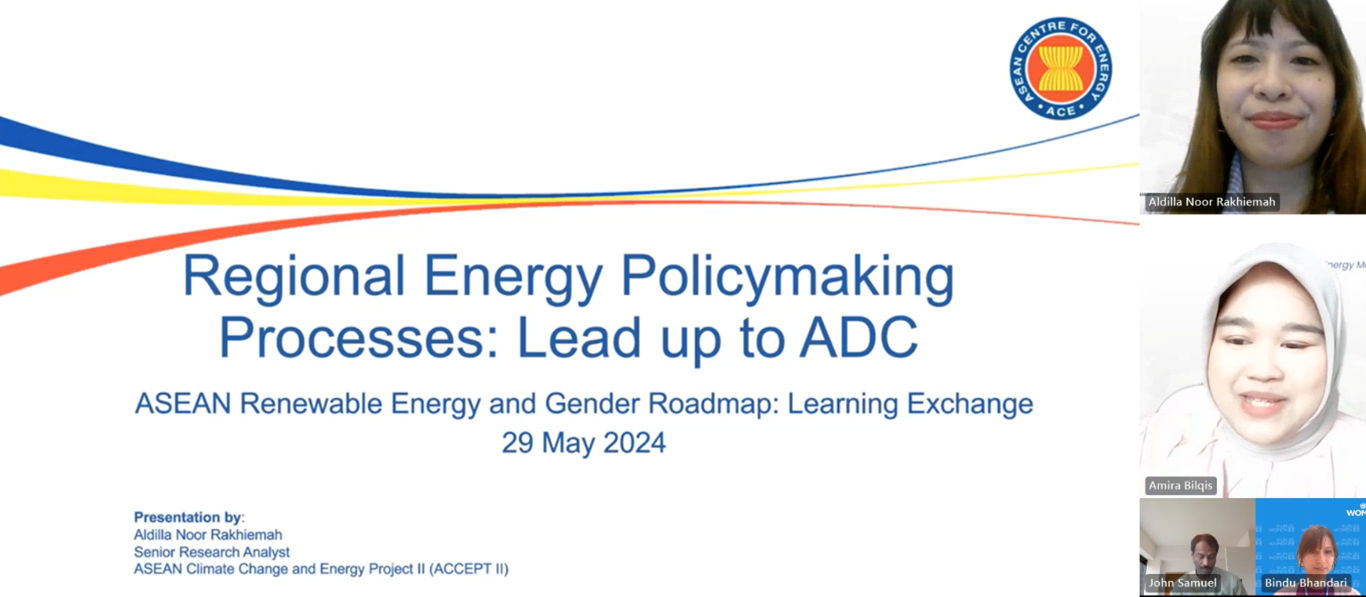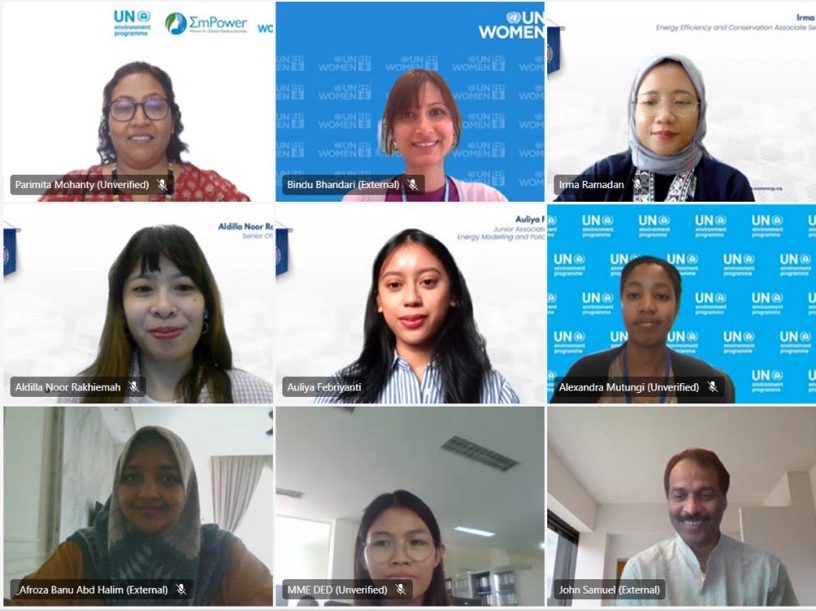i
i
Online, 29 May 2024

Figure 1. Regional Energy Policymaking Processes: Lead Up to ADC presented by Aldilla Noor Rakhiemah, Senior Analyst ACCEPT II
ASEAN is committed to accelerating a just and inclusive energy transition, as these very words are taken from the 41st ASEAN Ministers on Energy Meeting (AMEM)’s Joint Ministerial Statement. In realising this statement, the topic of gender mainstreaming and integrating gender-responsive policies within regional energy policies has just begun to rise.
The workshop entitled “Strategic Approaches to Gender Mainstreaming in ASEAN Energy Policy: Road to New Phase of ASEAN Plan of Action for Energy Cooperation (APAEC)” supports ACCEPT II’s objective of promoting gender equality in the energy sector. Held on 29th May 2024, Aldilla Noor Rakhiemah, Senior Research Analyst of ACCEPT II was given the opportunity to share insights on advocating regional energy policymaking processes for the next cycle of APAEC.
Align with the panel session’s theme, “Inclusive Decision Making for ASEAN Energy-Transition”, addressing the essence of gender mainstreaming and unveiling the catalyst to realise the vision. As one of the presenters, Aldilla delivered a presentation entitled “Regional Energy Policymaking Processes: Lead Up to APAEC Drafting Committee (ADC) Meeting”. In the session alongside her were John Samuel, Asia Region Director of Oxfam International; Bindu Bhandari, Program Analyst (Gender and Climate) at UN Women; and Alexandra Mutungi, Gender and Climate Change Specialist at UNEP. The panel discussion is moderated by Amira Bilqis, Analyst at the ASEAN Centre for Energy.
The presentation was kicked off by introducing the ASEAN Plan of Action for Energy Cooperation (2021-2025), the policy document that has been established and set as a guiding principle for ASEAN multilateral energy cooperation under the ASEAN Economic Community. With seven pillars tacked under the theme “Enhancing Energy Connectivity and Market Integration in ASEAN to Achieve Energy Security, Accessibility, Affordability and Sustainability for All”, APAEC Phase II will be due by this year, and she foresees the ASEAN Post-25 will be calibrated towards ASEAN Community Vision 2045 and ASEAN Economic Community Strategic Plans 2026-2030. Thus, the APAEC Drafting Committee (ADC) has been appointed to develop and formulate the next cycle of APAEC post-2025. Even so, only 31% of female participation is present in the APAEC Drafting Committee (ADC). As a concrete timeline is already in the pipeline, Aldilla expressed that gender and inclusivity in a low-carbon economy will be one of the key elements in the APAEC Post 2025.
In addition, Aldilla emphasised ACCEPT II’s vision to set a clear vision to promote gender equality in the energy sector through knowledge dissemination, capacity building, and policy advocacy related to the energy-climate nexus in ASEAN. Moreover, several studies and activities were also conducted by ACCEPT II in conjunction with gender mainstreaming and raising awareness of women’s involvement in the energy-climate sector that involves the ASEAN Member States as well.

Figure 2. Q&A session with all panelists.
Moving to the discussion session, Aldilla suggested several recommendations for progressing to mainstream RE-Gender Initiatives in ASEAN. The first is through harmonised gender policies among the AMS to have consistency and comprehensive implementation as some AMSs have more advanced policies compared to others. Other aspects that need to be addressed are data improvement and financial resources. Aldilla also conveyed the need to establish proper reporting on mainstreaming policies and guidelines among the AMS, which will allow monitoring and facilitation. In addition, stakeholder collaboration and coordination and a strong political will from the government are essential between the international organisation and civil society organisations, and government agencies.
As the evening ended with fruitful takeaways, there are still many efforts to mainstream RE-Gender. The top-down approach will require continuous effort and collaboration to mobilise the efforts. Moreover, bottom-up efforts are also urgently needed to create multisectoral approaches to shaping the gender mainstreaming pathways in ASEAN.
(KAC & IB)
Join our ASEAN Researchers Network on Climate Change (ARNECC) by registering yourself here. Become a part of our collaborative efforts to address pressing climate challenges and shape a sustainable future.
Detailed information on ACCEPT II can be found at https://accept.aseanenergy.org/
We welcome any future collaboration, please feel free to contact us at [email protected]